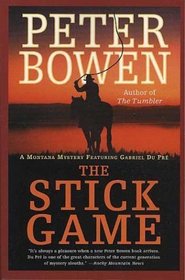Seventh in the series, and probably better if you're already a little familiar with the characters. There's no mystery here, although there are two deaths by suicide. The main story is the pollution of the groundwater by a huge mining corporation, their utter indifference to the law, and the inability of the residents to bring them to account. The problems on the reservation make this melancholy - alcoholism, drug use, unemployment. The major employer is the mine, pumping poison into the water they have to drink. There are Bowen's usual rich characters, excellent sense of place, unique dialect, and rather poetical writing. Not for the first time I wish there were a music playlist to go along with the book. I was happy that Du Pre didn't spend half the book griping about Benetsee not telling him what to do. But while it ended on a hopeful note, I think Bowen relied on Bart and his fortune way too much. Whatever happened, there was Bart, willing to shell out thousands of dollars (millions, actually) to make it better. That was a bit too fairy-tale, although it's hard to see a positive ending otherwise.
Indians are becoming sick, due to heavy metal poisoning which originates from a mining company's injection well. Gabriel DuPre is a brand inspector and charged by his girlfriend (whose cousin's children are affected) to find out what is going on.
The story consists of a lot of cliches (white man destroys Indian land, two guys who keep fighting, but who are actually best friends, the philanthropic millionaire in the background, the scientists who are outraged by the practices of the mining company), but the characterizations and - at times - the prose is nice. Imitating the manner in which the Metis Indians speak was rather off-putting to me, because it interrupts the flow of reading; I often had to re-read sentences to get their meaning. It might be an accurate portrayal of how they speak, but doesn't "do" it for me. The main character feels as if he is how the author would like to be perceived.
What I did appreciate was the description of the Indian stick game towards the end, something which was new to me.
It is more instructive of a way of life rather than a mystery.
All in all: not bad, but because of the dialect I will not be reading any more of this series.
The story consists of a lot of cliches (white man destroys Indian land, two guys who keep fighting, but who are actually best friends, the philanthropic millionaire in the background, the scientists who are outraged by the practices of the mining company), but the characterizations and - at times - the prose is nice. Imitating the manner in which the Metis Indians speak was rather off-putting to me, because it interrupts the flow of reading; I often had to re-read sentences to get their meaning. It might be an accurate portrayal of how they speak, but doesn't "do" it for me. The main character feels as if he is how the author would like to be perceived.
What I did appreciate was the description of the Indian stick game towards the end, something which was new to me.
It is more instructive of a way of life rather than a mystery.
All in all: not bad, but because of the dialect I will not be reading any more of this series.




